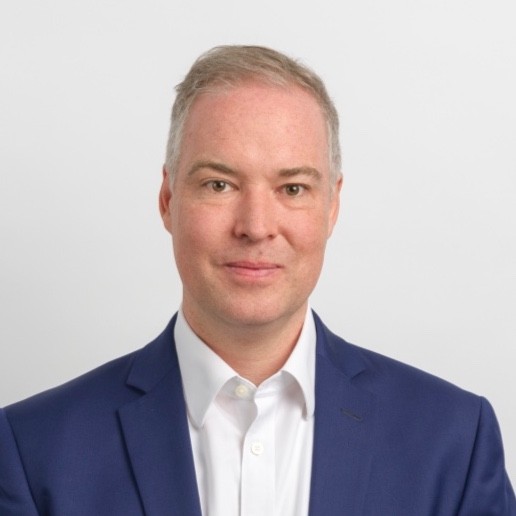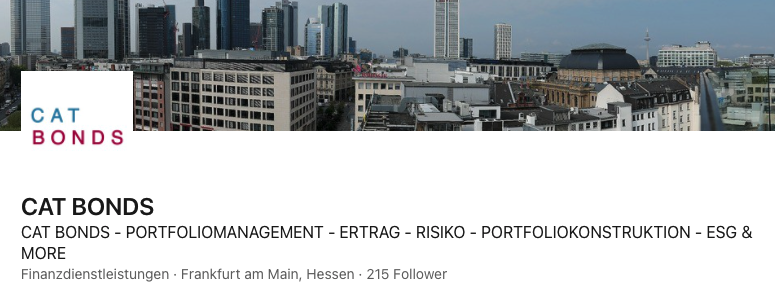Topics such as ESG, climate change, and the current investment needs of institutional investors are intensively discussed. Markus Hill spoke for FUNDBOUTIQUES.COM with Daniel Grieger, Plenum Investments AG, about the challenges for portfolio management in the fixed income segment, the topic CAT Bonds (Insurance-Linked Securities), and about his enthusiasm for this special segment. Additionally, the importance of subordinated bonds in banks and insurance companies was discussed as well as the importance of empathy (keyword: diversity of interests & perspectives – “palms of steel”).
Hill: How long have you been involved with the topic of insurance-linked securities (CAT bonds)?
Grieger: I originally come from Mannheim, my studies in St. Gallen were the reason for my emigration. At the St. Gallen Symposium, I heard the then CEO of Swiss Re, Walter Kielholz, speak about climate change and was thrilled that a profit-oriented company was taking on the topic. I started working for the Institute of Insurance Economics, wrote my thesis in 1999 on CAT Bonds, and – had my first job at Swiss Re. At the time, there was no money to be made in CAT Bonds, and the regulatory arbitrage between bank regulation and the then almost non-existent regulation of reinsurers brought quite different opportunities. I became an underwriter and did mostly structured credit and credit derivatives. It was an exciting time but it wasn’t until I moved to Horizon21 and the aftermath of Hurricane Katrina in 2007 that I started looking at CAT Bonds again, and then immediately as an investor. The interface between the insurance industry and asset management has stuck with me ever since. Both worlds have their peculiarities and I find bridging them very exciting. Besides, my job is about making a small contribution to keeping insurance premiums affordable in certain geographies and thereby mitigating the impact of climate change on private households. But my work result will also hopefully ultimately ensure that investors achieve a higher and more stable return than with usual investment instruments.

Hill: What challenges are investors currently facing in the fixed income sector?
Grieger: Investors with thetraditional 60/40 approach are facing the challenge that a large part of their allocation has has become non-yielding paper. Many corporate bond issuers have used the past few years to secure attractive conditions by placing bonds with the longest possible maturities. So the duration of corporate bonds has tended to rise – while interest rates have remained at record lows. So anyone who wants to continue investing in corporate bonds would have to take on more credit risk. Or they could turn to niches such as insurance subordinated debt. Here, strong regulation of insurers ensures that issuers meet high solvency requirements. The investment universe is pre-filtered, so to speak, by the local regulators in the individual European countries. Nevertheless, these bonds still pay attractive yields.
Hill: How can insurance-linked securities offer solutions here?
Grieger: I would like to define the term insurance-linked securities more broadly here and also include the debt capital that insurers issue. In my opinion, it doesn’t matter in which format I provide capital to an insurer. Whether it’s a CAT bond or a subordinated bond, the insurer will ultimately be able to write more business. CAT bonds are characterized by the fact that they cover the pure natural hazard risk and generate a market-independent return, provided the earth doesn’t shake or the wind doesn’t blow. There is no credit or duration risk here. Subordinated bonds embody both interest rate and issuer default risk. Both instruments are suitable for investors in 2021. Interest rates are likely to rise in the medium term due to synchronized economic stimulus programs around the world. Government bonds will then no longer be attractive. If investors are now looking for a substitute in the fixed-income area, CAT bonds, and subordinated insurance bonds are suitable in both cases. The CAT bonds are floaters. The spreads are relatively attractive due to the healthy market environment for reinsurers. The insurance subordinates also pay surprisingly high yields, but they also come with interest rate risk.
Hill: What are you dealing with more intensively from a technical point of view at the moment?
Grieger: We have just completed preparations for the launch of a pure fund for insurance subordinates. As mentioned above, investors are looking for alternatives on the fixed income side. Often, subordinated bank debt is already used, but there is a lack of expertise for subordinated insurance debt. This can be bought in through our fund – with daily liquidity. I’m also looking at secondary risks – by which I mean forest fires and floods. Both risks are increasing due to climate change, and the question is to what extent one wants to expose one’s portfolio here. I am rather cautious about these risks. But I’m not the only one, and there are quite high returns that are tempting here. For example, the National Flood Insurance Program in the U.S. has just placed a CAT bond that covers flooding due to hurricanes in the U.S. – the less risky tranche, for example, already pays 13%.
Hill: The world does not just finance. What are you currently reading?
Grieger: I’m currently reading Dominik Bloh’s book (Unter Palmen aus Stahl – Geschichte eines Straßenjungen), which describes his time as a homeless man in Hamburg. It is a biography that shows the circumstances under which a person can end up homeless in Germany and how difficult it is to escape this situation again. It is a vicious circle, i.e. “no fixed residence, no job”, “no job, no bank account”, “no bank account, no phone” and so again to the status “no phone, no job”. At the same time, it is hard to believe that someone without any material possessions is enthusiastically helping Syrian refugees. The indifference of government agencies is shocking and dispels the prejudice that homeless people are helped without further ado in a rich country like Germany.
Hill: Thank you very much for the interview.
Daniel Grieger is a member of the management board at Plenum Investor Services UG.
PLENUM INVESTMENTS AG: www.plenum.ch
Related articles:


5 thoughts on “FUND BOUTIQUES & PRIVATE LABEL FUNDS: CAT Bonds, Climate Change, Risk Management & “Palms of Steel” (Interview – Daniel Grieger, Plenum Investments AG)”